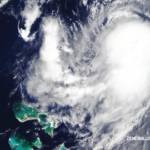At 9 a.m., I was roused by the clatter of the arriving ticket agents and, heart beating quickly, waited in a snaking line of anxious travelers, feeling desperate as valuable minutes passed. Eventually, I got to the front and implored for help to an agent named Paloma who had red-purple hair and vibrant eyes. Saint Paloma, as we later called her, did some magic with her computer and got us seats on US Airways 741 at 12:35 p.m. and didn’t even hit us with a rebooking charge. We went off for breakfast and a jolt of espresso to keep us awake until boarding time.
When we finally boarded the plane, we were surprised to discover empty seats. While people were struggling to evacuate the continent, they couldn’t get to Madrid, no doubt stranded elsewhere because of a paucity of connecting flights. As in Casablanca, the trick was to get to an airport. For Victor Laszlo and Ilsa Lund, it was two letters of transit. For my wife and me, it was the van to Madrid.
Flight 741 and our connector were on time, and we returned home a mere 40 hours after starting our journey. Without even taking a shower, I went to bed and fell asleep instantly, although I was besieged by a barrage of hallucinatory dreams about armed guards with machine guns threatening to shoot me as I stood next to a cliff. Even if my sleep was mixed up, it was welcome.
I have enjoyed sharing this account. If nothing else, it has been cathartic and resembles expressive journal-writing activities that help people with post-traumatic stress disorder. In telling this tale, I have had a more serious purpose in mind. In my next column, I will discuss this purpose and try to connect what I learned about escaping a volcano from the work I do every day in the clinic.
Dr. Pisetsky is physician editor of The Rheumatologist and professor of medicine and immunology at Duke University Medical Center in Durham, N.C.
